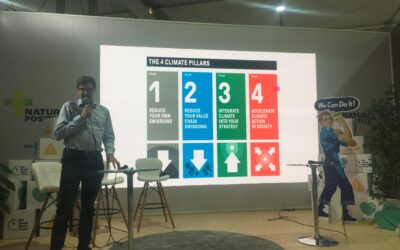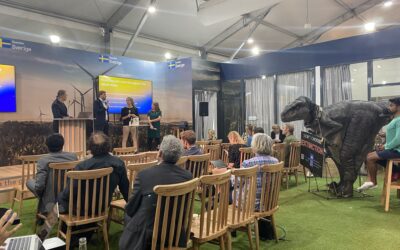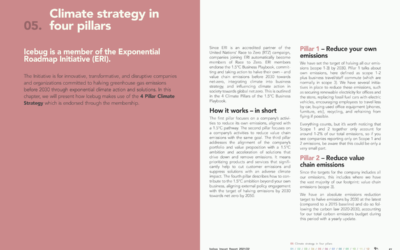As a member of the Exponential Roadmap Initiative, Unilever supports the 1.5°C Business Playbook – a guideline for exponential climate action – and is taking action across the 4 Climate Pillars of the Playbook. We spoke to Unilever in September 2022 to hear about their journey to net zero value chain emissions by 2039.
Integrating climate in business strategy
At Unilever, sustainability isn’t an add-on or a separate department. Our Purpose to make sustainable living commonplace means it’s embedded right across our business. After all, we know that brands with purpose grow, companies with purpose last, and people with purpose thrive.
The Unilever Compass, launched in 2020, places sustainability at the heart of our corporate strategy. It builds on 10 years of the Unilever Sustainable Living Plan and includes further action on climate, nature, people, and waste – interlinked challenges that need joined-up solutions.
For climate, it means changing the way we work in our factories, offices and labs, and engaging our brands, as well as partnering with others upstream and downstream of our operations and in our wider value chain to lower our overall impact.
Our Climate Transition Action Plan (CTAP) is designed to guide our journey to reaching net zero greenhouse gas emissions across our value chain by 2039, with the stepping stones of reducing in absolute terms our operational emissions by 100% by 2030 (2015 baseline) and halving the full value chain footprint of our products, per consumer, by 2030 (2010 baseline).
Reducing own emissions
So far, we have lowered our operational emissions (Scope 1 and 2) by 64% since 2015, putting us on track to achieve our interim goal of a 70% reduction by 2025.
This progress has primarily been driven by our clean energy transition. Eco-efficiency projects across our factories – for example, efficient manufacturing equipment and heat recovery systems – have reduced CO2 from energy per tonne of production by 77% since 2008 and 14% since 2020. And in 2020 we achieved our goal of sourcing 100% renewable grid electricity.
Of course, we still have work to do, and over the coming years, our operational focus will be on shifting to renewable heat. Where low carbon technologies are not yet viable or available, we’re running pilots to demonstrate their potential – for example with heat pumps and hydrogen technology. We’re also phasing out high-impact refrigerants, and halving food waste in our operations by 2025.
“While there are many resources out there to help companies tackle climate change, the Exponential Roadmap and the 1.5°C Business Playbook are exceptional in that they recognise the urgency of the challenge, while making ambitious action accessible to organisations of any size,” Thomas Lingard, Global Head of Sustainability (Environment), Unilever.
Reducing value chain emissions
With climate action though, reducing our value chain (Scope 3) emissions is our biggest challenge. Unilever’s CTAP is focused squarely on short- and medium-term emissions reductions, only balancing out residual emissions with carbon removals by 2039.
To halve the footprint of our products by 2030, we’ve developed roadmaps for each of our five Business Groups – Nutrition, Ice Cream, Home Care, Beauty & Wellbeing, and Personal Care. They include everything from how we source our ingredients and formulate our products through to packaging design and distribution.
Upstream of our operations, we’ve launched the Unilever Climate Promise and Climate Programme to engage our suppliers on our value chain goals. The Climate Promise asks suppliers to halve their emissions this decade, regularly report on their progress, and share their product-level footprint data with Unilever.
The Climate Programme focuses on supporting the 300 with the biggest climate impact to move forward. Over recent months, we’ve been running a pilot with a subset of suppliers, testing tools and resources designed to help them accelerate their climate journey – no matter how far along they are.
At the same time, we’re committed to having a deforestation-free supply chain by 2023. After all, nature is a climate solution. We’re using technology to improve traceability and transparency, so that we can stop deforestation fast in its tracks.
Unilever is also driving change through R&D. Our Clean Future strategy, for example, sees us eliminating virgin fossil-derived chemicals from our cleaning and laundry formulations, which we estimate will reduce our product emissions by up to 20%. We’ve also launched pilots to warm up our ice cream freezers from -18°C to -12°C, and we want to influence others to join us.
Influencing climate action in society
As set out in the final pillar of the 1.5°C Business Playbook – a useful resource for companies looking to decarbonise in line with climate science – becoming a climate leader means using your company network and wider sphere of influence to support and accelerate climate action.
There is only so much one company can do to influence consumer behaviour, and so Unilever works to influence wider societal decarbonization and economy-wide energy transitions, and across systems such as energy and food.
For example, we participate in cross-sectoral initiatives such as the 1.5°C Supply Chain Leaders´, scaling up climate action in business supply chains, and as part of RE100 to signal corporate demand for 100% renewable electricity. And every year around the UN Climate Change Conference we advocate for ambitious government targets and policies.
What advice would Unilever give to other companies wanting to play their part in limiting global warming to 1.5°C? We’d say having a value chain-wide climate plan absolutely makes sense – and it’s the stepping stones that make it achievable.
The companies and brands taking ambitious climate action today are the ones securing business for the future. Consumers and investors expect it.





